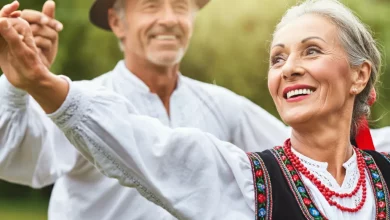How Does Community Engagement Improve Senior Health Outcomes?

Did you know that seniors who stay connected with their community tend to live longer, happier lives? It’s true! As our population ages, finding ways to keep older adults healthy and active becomes more important than ever. Let’s explore how community engagement can be a game-changer for senior health.
Imagine a world where growing older means growing more connected, not less. That’s the power of community engagement for seniors. With more people living longer than ever before, we need smart ways to keep our older adults healthy and happy. The good news? Being part of a community can do wonders for senior health!
What is Community Engagement for Seniors?
When we talk about community engagement for seniors, we mean any activity that gets older adults involved with others. It’s about staying connected and active in society. Here are some examples:
- Joining a book club at the local library
- Volunteering at a community garden
- Taking part in group exercise classes
- Attending social events at a senior center
These activities are different from just staying at home alone. They get seniors out and about, meeting people and trying new things.
The Link Between Community Engagement and Senior Health
Research shows that seniors who stay engaged with their community often enjoy better health. This isn’t just about feeling good – it can actually improve physical and mental health in measurable ways.
A study in the Journal of Gerontology found that socially active seniors had a 70% lower rate of cognitive decline compared to those who were less socially active. That’s a big difference!
Now, let’s look at how community engagement can boost senior health in different ways.
Physical Health Benefits
Staying active in the community can have amazing effects on a senior’s physical health. Here’s how:
- Increased physical activity: Group activities like walking clubs or dance classes keep seniors moving. This helps maintain strength, balance, and flexibility.
- Better nutrition: Community meals and cooking classes often lead to healthier eating habits. Seniors learn about good food choices and enjoy meals with others.
- Improved management of chronic conditions: Support groups help seniors cope with health issues like diabetes or heart disease. They share tips and encourage each other to stick to treatment plans.
Let’s compare the health of engaged vs. non-engaged seniors:
| Health Metric | Engaged Seniors | Non-Engaged Seniors |
|---|---|---|
| Physical Activity (minutes/week) | 150+ | Less than 60 |
| Healthy Meals (per week) | 15-21 | 7-14 |
| Doctor Visits (per year) | 2-3 (preventive) | 4+ (often emergency) |
Mental Health Advantages
Community engagement isn’t just good for the body – it’s great for the mind too! Here are some key benefits:
- Lower risk of cognitive decline: Staying socially active can help keep the brain sharp.
- Decreased chances of depression: Regular social interaction boosts mood and mental health.
- Higher self-esteem: Being part of a community gives seniors a sense of purpose and value.
Did you know? A study in the American Journal of Public Health found that seniors who volunteered showed a 24% lower risk of early death compared to non-volunteers.
Social and Emotional Well-being
Feeling connected to others is crucial for emotional health. Community engagement helps seniors:
- Fight loneliness: Regular social activities keep isolation at bay.
- Build support networks: Friends made through community activities can offer help and companionship.
- Boost overall happiness: Engaging with others often leads to more life satisfaction.
Here’s a quick story: Mary, age 72, joined a local gardening club. Not only did she make new friends, but she also found a renewed sense of purpose. “I wake up excited every day now,” she says. “I have people to talk to and something to look forward to.”
Practical Ways to Promote Community Engagement for Seniors
Getting involved in the community can be fun and easy. Here are some great options:
- Join local community center programs: Many offer classes, events, and activities specifically for seniors.
- Volunteer: Help at a local food bank, animal shelter, or library.
- Try intergenerational activities: Programs that bring seniors and younger people together can be very rewarding.
- Explore technology-based engagement: Virtual book clubs or online art classes can connect seniors from the comfort of home.
Overcoming Barriers to Community Engagement
Sometimes, seniors face challenges that make it hard to get involved. Let’s look at some common barriers and how to overcome them:
- Transportation issues: Look into local senior shuttle services or ride-sharing programs.
- Mobility concerns: Many community centers offer activities for those with limited mobility.
- Feeling shy or unsure: Encourage seniors to start small, perhaps by attending one event with a friend or family member.
Family members and caregivers play a crucial role in helping seniors stay engaged. They can provide encouragement, help with transportation, or even participate in activities together.
The Role of Healthcare Providers
Doctors and nurses can be great allies in promoting community engagement. They can:
- Prescribe social activities as part of a health plan
- Provide information about local community programs
- Explain the health benefits of staying socially active
Remember, community engagement can work alongside medical treatments to improve overall health and well-being.
Success Stories: Communities That Got It Right
Friendship Village in Schaumburg, Illinois
This retirement community created a “Brain Health Center University” program. Residents take classes on various subjects, keeping their minds active and engaged. The result? Improved cognitive function and higher life satisfaction among participants.
Village to Village Network
This nationwide program helps seniors create local “villages” – community groups that provide support and social connections. Members report feeling more independent and less isolated, leading to better overall health outcomes.
Conclusion
Community engagement is a powerful tool for improving senior health outcomes. From boosting physical activity to enhancing mental well-being, staying connected with others can make a world of difference.
Are you a senior looking to get more involved? Or do you have an older loved one who could benefit from community engagement? Take that first step today. Join a local club, sign up for a class, or volunteer for a cause you care about. Your health – and your happiness – will thank you for it.
Remember, healthy aging isn’t just about eating right and exercising. It’s also about staying connected, engaged, and part of a vibrant community. So get out there and get involved – your best years may still be ahead of you!



